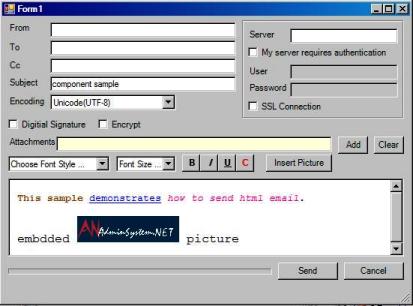Send Email with Embedded Images in Visual C++¶
In previous section, I introduced how to send email with file attachment. In this section, I will introduce how to add embedded images to email in Visual C++.
Introduction¶
To attach an embedded images to email, you should add an attachment to email at
first. Then you should assign an unique identifier(contentid) to this attachment.
Finally, you need to replace the <img src="your file name" /> to <img src="cid:yourcontentid"
/>.
Note
Remarks: All of samples in this section are based on first section: A simple Visual C++ project. To compile and run the following example codes successfully, please click here to learn how to create the test project and add reference of EASendMail to your project.
[Visual C++ Example - Add embedded images to email]¶
The following example codes demonstrate how to send email with embedded images.
Note
To get the full sample projects, please refer to Samples section.
#include "stdafx.h"
#include <tchar.h>
#include <Windows.h>
#include <atlbase.h>
#include <atlcom.h>
#include "EASendMailObj.tlh"
using namespace EASendMailObjLib;
const int ConnectNormal = 0;
const int ConnectSSLAuto = 1;
const int ConnectSTARTTLS = 2;
const int ConnectDirectSSL = 3;
const int ConnectTryTLS = 4;
int _tmain(int argc, _TCHAR* argv[])
{
::CoInitialize(NULL);
IMailPtr oSmtp = NULL;
oSmtp.CreateInstance(__uuidof(EASendMailObjLib::Mail));
oSmtp->LicenseCode = _T("TryIt");
// Set your sender email address
oSmtp->FromAddr = _T("test@emailarchitect.net");
// Add recipient email address
oSmtp->AddRecipientEx(_T("support@emailarchitect.net"), 0);
// Set email subject
oSmtp->Subject = _T("HTML email from Visual C++ project with inline image");
// Add embedded image and return the unique identifier of the attachment
_bstr_t cid = oSmtp->AddInline(_T("c:\\test.gif"));
if(cid.length() == 0)
{
_tprintf(_T("failed add embedded image with error: %s"),
(const TCHAR*)oSmtp->GetLastErrDescription());
}
// Set HTML body format
oSmtp->BodyFormat = 1;
// Use the cid as link in the body text
oSmtp->BodyText = _bstr_t("<html><body>Hello, this is a embedded <img src=\"cid:") + cid
+ _bstr_t("\" > picture.</body><html>");
// Your SMTP server address
oSmtp->ServerAddr = _T("smtp.emailarchitect.net");
// User and password for ESMTP authentication, if your server doesn't
// require User authentication, please remove the following codes.
oSmtp->UserName = _T("test@emailarchitect.net");
oSmtp->Password = _T("testpassword");
// Most mordern SMTP servers require SSL/TLS connection now.
// ConnectTryTLS means if server supports SSL/TLS, SSL/TLS will be used automatically.
oSmtp->ConnectType = ConnectTryTLS;
// If your SMTP server uses 587 port
// oSmtp->ServerPort = 587;
// If your SMTP server requires SSL/TLS connection on 25/587/465 port
// oSmtp->ServerPort = 25; // 25 or 587 or 465
// oSmtp->ConnectType = ConnectSSLAuto;
_tprintf(_T("Start to send HTML email with embedded image ...\r\n"));
if(oSmtp->SendMail() == 0)
{
_tprintf(_T("email was sent successfully!\r\n"));
}
else
{
_tprintf(_T("failed to send email with the following error: %s\r\n"),
(const TCHAR*)oSmtp->GetLastErrDescription());
}
return 0;
}
To attach embedded images/pictures, ImportMailEx and ImportHtml methods are strongly recommended. With these methods, you don’t have to specify the ContentID manually. The html source/file html body can be imported to email with embedded pictures automatically.
You can also refer to the htmlmail.* samples in EASendMail Installer. Those samples demonstrate how to build a HTML email editor and send HTML email with attachment or embedded images/pictures.

Next Section
At next section I will introduce how to sign email with digital certificate.
Appendix
- EASendMail SMTP Component SDK
- Process Bounced Email (Non-Delivery Report) and Email Tracking
- Bulk Email Sender Guidelines
- Work with Email Queue
- Registration-free COM/ActiveX with Manifest File (Distribution)
Comments
If you have any comments or questions about above example codes, please click here to add your comments.
